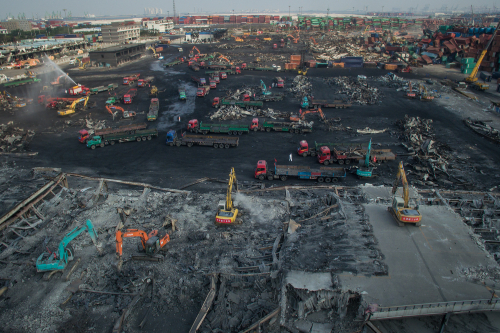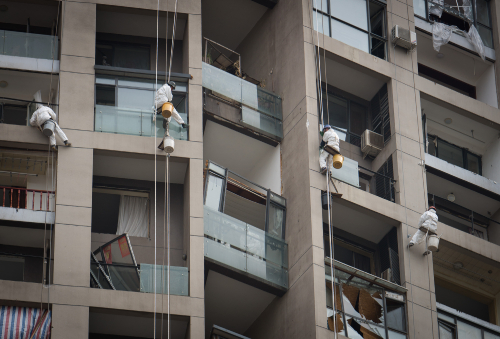|
 |
|
A monument will be erected on the site of the blasts in memory of people who lost their lives (XINHUA) |
The first class back from summer break for many students in schools in the Binhai New Area of Tianjin, a municipality in north China, is taught by psychologists.
The school semester began on September 1, not even a month after two deadly explosions ripped through a warehouse in the area on August 12. By September 8, a total of 163 had been pronounced dead and 12 still missing.
The warehouse was storing large amounts of toxic chemicals, including around 700 tons of sodium cyanide. The explosions destroyed apartment buildings nearby and affected hundreds of primary schools and middle schools in the area.
After the explosions, the local government and rescue workers worked hard to ensure more than 300 schools in the area could begin the new semester on time. The plan includes new primary schools and kindergartens.
Back to school
The No. 2 Elementary School of the Binhai New Area Development Zone served as the temporary settlement for the homeless after the explosions. On August 20, the people staying there were relocated, and the local government repaired the affected buildings in the school and cleaned the surrounding area.
A notice board was put at the entrance of the school, detailing the repairing and cleaning process and listing the numbers of the environmental monitoring results in the surrounding area.
A father surnamed Wang read the notice board carefully and explained it to his daughter, who is a second-grade student at the school.
"They will update the environmental monitoring result every day, and it really helps a lot to remove parents' worries on the possible negative effects of the blasts on the children," said Wang.
Liang Chunguang is a Chinese fifth-grade teacher as well as a school psychological counselor in the school. She took the first class of the semester for the students.
"Some students didn't look happy at the beginning, but after we played games and shared stories, they looked a lot happier," said Liang.
Tianjin Teda Maple Leaf International School is only 2.7 km away from the blast site. When the explosions rocked the area on August 12,
there were 800 students boarding in the school. All of them were terrified.
"I was horrified that night and haven't slept well since then," said Yu Ying, one of the boarding students in the school. "After the class, I felt better when we played games together. It felt nice to be in a big group."
Liu Changyong, a member of the school management, revealed that more such classes will be held in September and October, as psychological aid will be needed so soon after the disaster.
Fifty professional psychologists from universities and hospitals in Tianjin were sent to seven affected schools to help.
 |
|
Workers repair the damaged windows caused by deadly explosions in Jinyu Lanwan community in the Tianjin Binhai New Area on August 25 (XINHUA) |
Back to normal
Tianjin's water supply was cut off immediately after the explosions to ensure that tap water remained unaffected.
"Cyanide levels in samples from rivers and offshore were below toxic levels," said Deng Xiaowen, head of the city environment monitoring center. "The air outside the core zone has also tested within national standards."
Meanwhile, though cyanide has been detected in the soil near the blast site in Tianjin, the concentration is within national standards, according to Tian Weiyong, Director of the Ministry of Environmental Protection's Environment Emergency Center, on August 22.
Sixteen of the 73 soil samples collected within a 5-km radius of the blasts' center have been found to contain toxic cyanide, but none of them exceed the national standard, said Tian.
Tianjin has conducted safety audits of 275 companies since the explosions, 70 of which were found to have safety problems and have had their operations suspended, according to Zhang Yong, head of the Binhai New Area.
The train station in the area was destroyed in the blasts. Service will not resume until early October.
On August 12, five state-owned property developers in the port city announced that they have formed an alliance to purchase apartments hit by the blasts from willing residents and re-sell them in the market after renovation. The blasts have affected 17,000 households to varying degrees.
"The surrounding area of these affected complexes will be revamped with greenery. There will also be no storage yard or chemicals at the blast site once it's all covered in green," said Di Da, Chairman of Tianjin Real Estate Group, one of the five developers.
In addition, more than 5,000 apartments from some residency communities for sale in the Binhai New Area were also made available for purchase to people who lost their homes in the explosions.
After the blasts, five teams deployed by the State Council have been assigned to investigate the cause, accountability and institutional loopholes that led to the fatal explosions. The findings will be published once all evidence has been submitted to the State Council.
Meanwhile, China's top procuratorate Supreme People's Procuratorate (SPP) on August 27 announced its investigation into the officials and port executives for alleged neglect of duty in the explosions.
The officials under investigation include Wu Dai, head of the Tianjin Municipal Transportation Commission, and Zheng Qingyue, President of Tianjin Port (Group) Co. Ltd.
Another official, Wang Jinwen, who is a senior official with the Ministry of Transport, is also being investigated for a suspected abuse of power.
An investigation by the SPP found Wang violated the law to help Tianjin Ruihai International Logistics Co. Ltd., owner of the blasted warehouse, pass safety evaluations and obtain approval to handle hazardous materials.
On September 4, Tianjin announced it would build an ecological park on the site of the blasts. The park is supposed to cover 24 hectares, and a monument in memory of people who lost their lives in the accident will hold a place of pride in the park.
Zhang Yong, head of the Binhai New Area, said that 365 enterprises registered in the district from August 13 to 20, 17 of which are foreign-funded enterprises.
"This reflects that enterprises at home and abroad still have confidence in the development of the Binhai New Area," said Zhang.
About 1,700 enterprises are estimated to have been affected by the blasts. "The government will help the affected companies to resume production as soon as possible," said Zhang.
Copyedited by Kylee McIntyre
| 